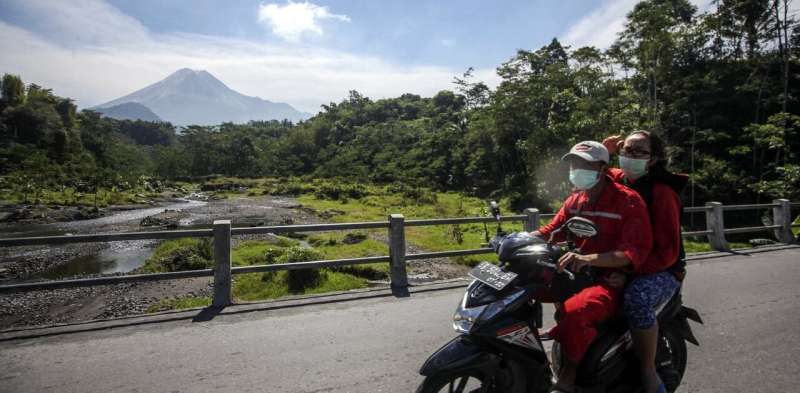Living with natural disasters – how to change Indonesia's culture of passive resignation

Situated in the "Ring of Fire", one of the most geologically active regions in the world, Indonesia is prone to natural disasters, as the past year has grimly confirmed.
Seemingly endless earthquakes throughout Bali and Lombok through July and August killed over 600 people. Not long after, another earthquake struck the coast of Central Sulawesi, followed by a localised tsunami that washed over the town of Palu. More than 2,100 people died. And just a few days before Christmas, a tsunami struck the coasts of Java and Sumatra. Triggered by parts of Anak Krakatau volcano collapsing into the sea following an eruption, it killed at least 420 people.
Analysts have commented on the government's preparedness and response to these disasters. But among the public elements of faith have been intertwined into explanations of destruction. For example, two mosques in Palu were left standing – while others were decimated – sparking debate over the nature of divine intervention.
Whether in direct response to these events or as a way of coping with their consequences, many Indonesians often react to the unpredictability of the natural world with a "wait and see" attitude.
Indonesians use the concept pasrah, which means surrender to God, to articulate this attitude. Pasrah has different meanings for different individuals and communities, but the concept itself has a common thread throughout the world's religions. With pasrah, the fate of humanity is determined entirely by God, so there is little sense in planning for unforeseeable consequences. Under other interpretations, it is the concept of trying as hard as one can, but understanding that, after a certain point, the rest is up to fate.
While not a uniquely Indonesian concept, its prevalence throughout the archipelago affects both natural disaster planning and environmental conservation. When all is predestined, what is the point in planning for the changing natural world, or acknowledging that humans have a role in protecting it?
Passive resignation to disasters
The causes of many of these natural disasters in Indonesia also make it one of the most environmentally productive regions in the world. The country has nutrient-rich soil and coral reefs lush with fish. For generations, Indonesian people and Western colonisers have thrived off these resources.
However, the seemingly boundless riches—exploited through mining, palm oil production, and overfishing—have combined to create an impossible dilemma: Indonesia has some of the fastest rates of environmental destruction in the world, and there seem to be no effective solutions in sight.
It continues to be a struggle for the Indonesian government to prepare local communities for disaster, whether human-made or natural, especially when people generally believe that, whatever happens, it is the will of God.
Between June and September 2018, we interviewed residents in Yogyakarta and Salatiga, Central Java, to better understand what the concept of pasrah towards both natural and man-made environmental disasters means to local residents, and how it influences people's motivation to prepare for future emergency situations caused by environmental change.
The residents of Yogyakarta live close to Mount Merapi, one of the most active of more than 100 Indonesian volcanoes and among the most dangerous volcanoes on earth. The town of Salatiga is 23 kilometres north of the base of Mt Merapi, and many of its residents remember the eruptions of the past. Salatiga is the largest town in the high-risk area, with over 170,000 residents.
We surveyed and interviewed around 30 residents from a variety of backgrounds, and it became apparent that regard for pasrah and a predestined future strongly influenced concern about environmental preservation.
We found that those who were more inclined to believe that natural disasters were directly influenced by God were less likely to see humans as the cause of environmental destruction. Conversely, those who did not view natural disasters as a result of God's will were more likely to see humanity's role in environmental degradation such as plastic pollution, air and water pollution, and natural resource overuse (overfishing/deforestation).
It is important to note that, for many people we talked to pasrah is not simply resignation: it is a belief resulting from an inability to leave a disaster-prone area, due to lack of resources or places to go, or failure of the government to respond to unparalleled rates of environmental destruction, from overfishing to deforestation to plastic pollution.
Recognising religious and cultural attitudes
In the wake of the immense destruction in Indonesia, it is increasingly critical that the government recognise religious and cultural attitudes that hinder effective natural disaster responses, as well as the external factors that prevent people from leaving in time, such as the failure of warning systems.
In terms of environmental stewardship, religious concepts beyond pasrah can also provide valuable lessons for overcoming the problem of the tragedy of the commons. Over 750 verses in the Quran relate to the environment. Likewise, the Christian religion teaches respect for all creation.
These teachings were widely recognised among the people surveyed, and added a critical perspective to the context of pasrah in everyday life.
Related to this, as environmental degradation occurs at rapidly increasing rates, understanding how these same cultural beliefs enable – or discourage – environmental stewardship is equally important. Religious teachings can provide insight into overcoming these barriers. But ultimately a more in-depth understanding of the diverse communities across Indonesia, and the variety of challenges they face, is the first step to prepare people for when disaster strikes.
While the future may remain the will of God, the future health of the world's environment remains in human hands.
Provided by The Conversation
This article is republished from The Conversation under a Creative Commons license. Read the original article.![]()




















